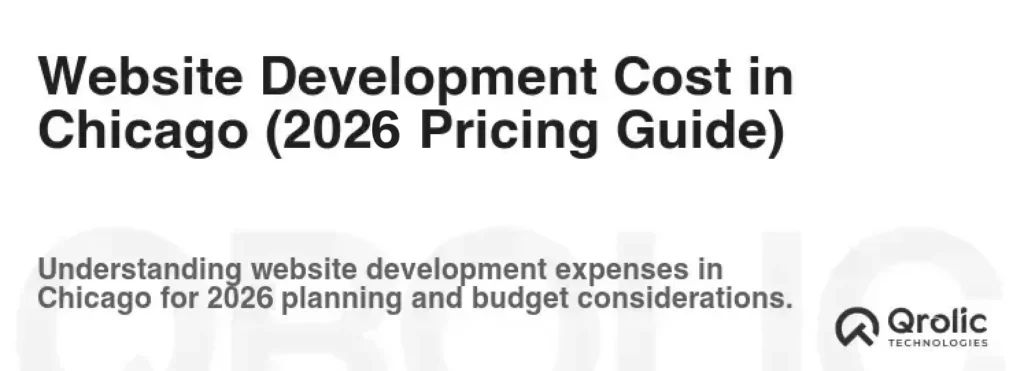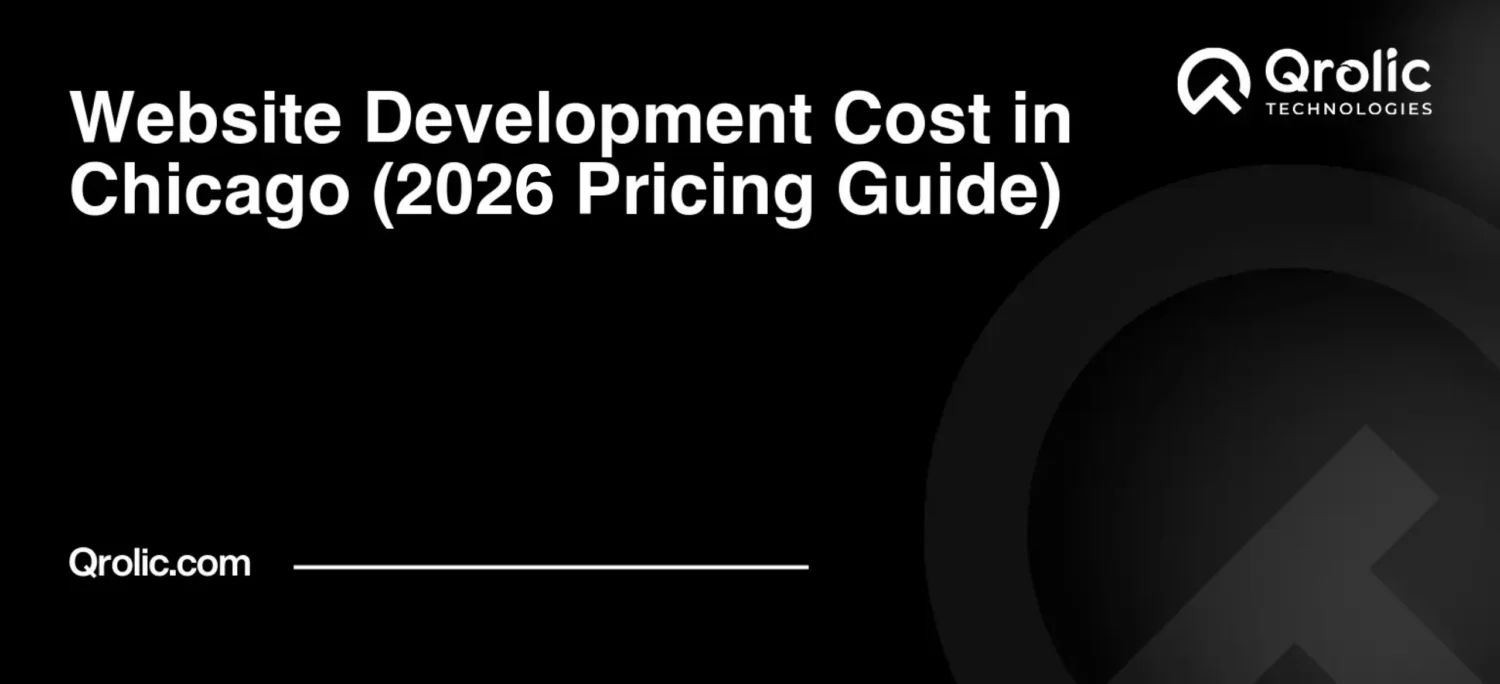Quick Summary:
- Website costs vary by type and complexity.
- Factor in ongoing costs like maintenance and marketing.
- Define your needs clearly for accurate quotes.
- Professional websites boost Chicago business credibility.
Table of Contents
- Website Development Cost in Chicago (2026 Pricing Guide)
- The “Chicago Premium”: Why Local Rates Matter
- The Talent Ecosystem
- 2026 Labor Market Trends
- 2026 Price Breakdown by Website Type
- 1. The Small Business “Growth” Site
- 2. The Mid-Market Corporate Website
- 3. E-commerce Powerhouse
- 4. Custom Web Applications & SaaS
- What Factors Drive the Cost Up? (The 2026 Checklist)
- AI & Automation Integration
- High-End UI/UX Design
- Technical SEO & Local Authority
- Maintenance: The “Hidden” Annual Budget
- Maximizing Your ROI with Qrolic Technologies
- Why Qrolic Technologies is the Smart Choice for Chicago Businesses
- 5 Steps to Get the Best Price on Your Chicago Website
- Conclusion: Building for the Future
Website Development Cost in Chicago (2026 Pricing Guide)

In the city of big shoulders and even bigger business ambitions, your website is the digital skyscraper of your brand. Whether you’re a scrappy startup in the West Loop or an established firm on LaSalle Street, your online presence is often the first “handshake” a client experiences.
But as we move through 2026, the question isn’t just “Do I need a website?”—it’s “How much will it cost to build a world-class digital experience in Chicago?”
The landscape of Web Development has shifted. AI integrations, mobile-first indexing, and hyper-local SEO are no longer “optional extras”; they are the baseline for success. In this guide, we will break down the real-world costs of website development in Chicago for 2026, helping you budget with confidence.
The “Chicago Premium”: Why Local Rates Matter
Chicago remains one of the top tech hubs in the United States. While it is more affordable than Silicon Valley or Manhattan, it commands a premium over smaller Midwestern cities.
The Talent Ecosystem
Chicago is home to elite institutions and a massive pool of developers who understand the specific needs of the manufacturing, logistics, healthcare, and finance sectors that dominate the region. When you hire a Chicago agency, you aren’t just paying for code; you are paying for industry-specific strategic insight.
2026 Labor Market Trends
By 2026, hourly rates for mid-to-senior developers in Chicago have stabilized but remain competitive. You can expect to see:
- Freelance Rates: $75 – $150 per hour.
- Boutique Agency Rates: $150 – $250 per hour.
- Enterprise Agency Rates: $250 – $450+ per hour.
2026 Price Breakdown by Website Type
The cost of your project is primarily driven by the “What” and the “How.” Here is a realistic look at Chicago-based pricing for different tiers of development.
1. The Small Business “Growth” Site
This is for the local service provider or professional who needs a high-converting, professional presence.
- Pages: 5–12 pages.
- Features: Mobile-responsive design, basic SEO setup, contact forms, and Google Business Profile integration.
- Platform: Often built on wordpress or Webflow.
- Chicago Price Range: $5,000 – $12,000.
2. The Mid-Market Corporate Website
Designed for established businesses that require a more robust content strategy and deeper integrations.
- Pages: 20–50 pages.
- Features: Custom CMS configurations, team profiles, gated content (whitepapers/case studies), and CRM integration (Salesforce/HubSpot).
- Chicago Price Range: $15,000 – $45,000.
3. E-commerce Powerhouse
For retail brands selling locally or nationally, requiring secure, high-speed shopping experiences.
- Features: Product catalogs, secure payment gateways (Stripe/PayPal), inventory management, and AI-driven product recommendations.
- Platform: Shopify Plus, Magento (Adobe Commerce), or custom WooCommerce.
- Chicago Price Range: $25,000 – $80,000+.
4. Custom Web Applications & SaaS
When the website is the business (e.g., a customer portal, a booking engine, or a specialized data dashboard).
- Tech Stack: React, Node.js, Python/Django, or Next.js.
- Chicago Price Range: Starting at $50,000; complex builds often exceed $150,000.
What Factors Drive the Cost Up? (The 2026 Checklist)
In 2026, several technical and strategic elements have become standard “cost drivers.”
AI & Automation Integration
Standard websites now often include AI-powered chatbots or dynamic content blocks that personalize the user experience. Adding these smart features typically adds $3,000 – $7,000 to a project budget.
High-End UI/UX Design
Chicago users expect a “premium” feel. Custom animations, unique iconography, and extensive user-journey testing ensure that visitors don’t just land on your site—they stay. High-end design can account for 30% to 40% of your total bill.
Technical SEO & Local Authority
Search engines in 2026 are smarter than ever. A site must be technically perfect—Schema markup, fast Core Web Vitals, and localized content—to rank in Chicago’s competitive search results. Professional SEO setup usually adds $2,500 – $6,000 upfront.
Maintenance: The “Hidden” Annual Budget
A website is a living asset. In Chicago, maintaining a professional site in 2026 requires an annual budget for the following:
| Item | Estimated Annual Cost |
| Managed Hosting | $600 – $2,400 |
| Security & SSL | $200 – $1,200 |
| Maintenance Retainer | $1,200 – $5,000 |
| Domain & Licenses | $100 – $500 |
Maximizing Your ROI with Qrolic Technologies
Navigating the high costs of a major metropolitan area like Chicago can be daunting. Many businesses find that the local “Full-Service Agency” price tag doesn’t always align with their immediate cash flow. This is where Qrolic Technologies provides a strategic advantage.
Why Qrolic Technologies is the Smart Choice for Chicago Businesses
Qrolic Technologies bridges the gap between high-level American business standards and cost-efficient global development.
- WordPress Specialists: They excel at building highly customized WordPress sites that look like bespoke $50k projects but are delivered with much higher efficiency.
- Scalable Development: Whether you need a simple landing page or a complex React-based application, Qrolic has the depth of talent to scale with your needs.
- Transparency: They remove the “mystery” from web development pricing. You get clear milestones and predictable costs, ensuring your project stays on budget and on time.
- Local Strategy, Global Reach: By partnering with Qrolic Technologies, Chicago businesses can leverage elite technical talent without the massive overhead costs of a downtown Loop office.
5 Steps to Get the Best Price on Your Chicago Website
To ensure you aren’t overpaying, follow this tactical approach:
- Define Your MVP (Minimum Viable Product): Don’t build every “bell and whistle” on day one. Launch the core site and add features as you see user demand.
- Request a Detailed Scope of Work: Never accept a “lump sum” quote. Ask for a breakdown of hours for design, front-end, back-end, and QA.
- Check Local References: If hiring a Chicago agency, talk to their current clients. Ask about their post-launch support.
- Prioritize Performance over Flash: A site that loads in 1 second is more valuable than a site with 10 cool animations that takes 5 seconds to load.
- Consider Hybrid Models: Work with a local strategist for your brand voice but use a dedicated development house like Qrolic Technologies for the heavy technical lifting.
Conclusion: Building for the Future
The cost of website development in Chicago for 2026 reflects the city’s status as a world-class business hub. While a professional site requires a significant investment, the returns—in the form of trust, lead generation, and brand equity—are unparalleled.
Don’t let the price tag scare you away from digital excellence. By understanding the tiers of pricing and choosing a partner that balances quality with value, you can build a digital home for your business that stands the test of time.






